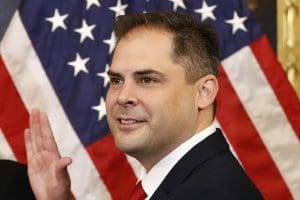House Republican allegedly failed to properly disclose finances and stock trades
Rep. Mike Garcia (R-CA) appears to have waited until after his November 2020 reelection to report the trades.

California Rep. Mike Garcia (R) appears to have allegedly violated federal laws requiring transparency for lawmakers who own and trade stocks.
The 1978 Ethics in Government Act requires members of Congress, as well as House and Senate candidates, to file an annual personal financial disclosure statement, making public the basic details of their income, debts, and holdings.
The 2012 Stop Trading on Congressional Knowledge (STOCK) Act also mandates that those serving in Congress disclose the stocks they buy or sell during their time in office.
Garcia, who was elected in a May 2020 special election, appears to have broken both laws in his first year in office.
In June 2020, he filed a financial disclosure “candidate report” noting his multiple homes, his cars, his Bank of America checking accounts, and his other assets.
But while House Ethics Committee guidelines make clear that filers must report “underlying assets in Brokerage Accounts” and in “IRAs, 401(k) Plans, and Other Non-Federal Retirement Accounts,” Garcia listed only that he owned an “Etrade Brokerage account” worth between $100,001 and $250,000 and a “FIdelity 401k” [sic] worth a similar amount.
He did not indicate what stocks or holdings were included in either account, making it impossible to evaluate any potential conflicts of interest.
Garcia listed those two investment accounts the same way in his July 2019 financial disclosure, with no disclosure of their contents.
He revealed some of his stocks later, but only after selling them.
Garcia made thousands of dollars’ worth of stock trades between July and September of 2020, including purchases of American Airlines stock, Direxion Financial Bull 3X fund shares, and Tesla stock, and a sale of Boeing stock.
Despite a clear requirement that these trades be reported within 45 days, none of them were. Instead, Garcia disclosed the transactions on Nov. 23 — after his narrow Nov. 3 reelection.
A spokesperson for Garcia did not immediately respond to an inquiry for this story.
Garcia’s took over his House seat after his predecessor, first-term Democratic Rep. Katie Hill, resigned in October 2019 amid an ethics investigation over allegations of inappropriate relationships with staffers.
He won that special election after highlighting his “honesty and integrity” and vowing to “get rid of the career politicians in both parties.”
“Washington, DC truly is a swamp filled with career politicians who are more concerned with their next election than making tough decisions,” he wrote on his campaign site.
It is unclear why Garcia chose to be opaque about his holdings and trades.
Beth Rotman, Money in Politics & Ethics program director for Common Cause, told The American Independent Foundation that the law was clear. “If somebody doesn’t disclose within 45 days, that’s a violation,” she said, confirming that the financial disclosure requirement “includes listing specific stocks.”
Cases like these highlight the need for more reform, she argued, as members of Congress are in privileged positions and have access to more information than regular investors.
“Yes, we need more transparency. Yes, the STOCK Act needs to be enforced,” she explained. “But the only real fix for these kinds of problems is to have Congress members put their holdings in blind trusts.”
Other lawmakers have faced significant scrutiny in recent months, specifically during the 2020 election season, over allegations that they inappropriately traded stocks during the pandemic based on inside information, including former Georgia Sens. David Perdue and Kelly Loeffler, who ultimately lost to their respective Democratic campaign rivals, Sens. Jon Ossoff and Raphael Warnock.
Both Perdue and Loeffler have said repeatedly that they did nothing wrong and have claimed they were cleared by the Securities and Exchange Commission, the Justice Department, and a Senate ethics panel, though as the Atlanta Journal-Constitution noted in December, those groups typically do not confirm or deny the existence of investigations into such matters “unless there are findings to act upon, which can sometimes take months or years.”
Published with permission of The American Independent Foundation.
Recommended

Biden calls for expanded child tax credit, taxes on wealthy in $7.2 trillion budget plan
President Joe Biden released his budget request for the upcoming fiscal year Monday, calling on Congress to stick to the spending agreement brokered last year and to revamp tax laws so that the “wealthy pay their fair share.”
By Jennifer Shutt, States Newsroom - March 11, 2024
December jobs report: Wages up, hiring steady as job market ends year strong
Friday’s jobs data showed a strong, resilient U.S. labor market with wages outpacing inflation — welcome news for Americans hoping to have more purchasing power in 2024.
By Casey Quinlan - January 05, 2024
Biden’s infrastructure law is boosting Nevada’s economy. Sam Brown opposed it.
The Nevada Republican U.S. Senate hopeful also spoke out against a rail project projected to create thousands of union jobs
By Jesse Valentine - November 15, 2023














































































